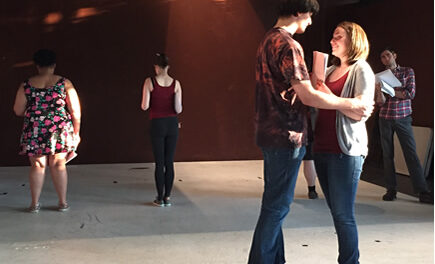The Winston-Salem Symphony, under the baton of guest conductor Martin West (the music director of the San Francisco Ballet), presented three audience favorites Sunday afternoon. The guest pianist, Alexander Kobrin, electrified the audience in a performance of Rachmaninoff’s 2nd Piano Concerto.
Kobrin was the winner of the 2005 Van Cliburn Competition Gold Medal, and his reading of the beloved Rachmaninoff brought insights and impassioned playing to the score. The composition of this Concerto in C minor, Op. 18 (1900-01), by Sergei Rachmaninoff (Russia, 1873-1947), is a story of overcoming depression with the help of therapy. The work is dedicated to Nikolai Dahl, the physician who help restore Rachmaninoff’s confidence. The work has subsequently become one of the most popular Romantic concertos.
The opening movement is loaded with seething passion, brought to the fore by the pianist. Kobrin seemed to explore the nooks and crannies of the accompaniment filigree, looking for secondary motives and tunes in the accompaniment, sometimes overshadowing the main tune. There’s a lot of drama in this movement, made even more evident by the pushing forward of the tempo by the pianist, sometimes resulting in less than perfect ensemble with the orchestra. A small price to pay for the excitement generated.
The second movement is plaintive and restful and featured an extended clarinet solo, superbly played by Anthony Taylor. Kobrin’s great sensitivity and flexible rhythm brought out lines not always heard in other performances.
The final movement put on display the fleet fingers of the pianist and showed his extreme facility. The violas get the first crack at the “big tune,” which they played with verve and passion. Both pianist and conductor, using grand gestures, milked this Romantic gem for all it was worth.
Pytor Iyich Tchaikovsky (Russia, 1840-93) wrote his beloved ballet, The Sleeping Beauty, in 1888-89. Although it was not an immediate hit, the composer thought about making a suite from five of the movements shortly after the premiere. However, it was not until after Tchaikovsky’s death that the composer’s friend Pyotr Jurgenson (Estonia, 1836-1904) arranged the present-day five-movement suite in 1899.
This is more Russian Romantic stuff! The brilliant opening of the Introduction for the entire orchestra set up the dramatic scene, although more languid music follows. A brilliant climax occurs, again calling on all the forces of the orchestra.
A Tchaikovsky ballet wouldn’t be a Tchaikovsky ballet without an important part for the harp, which is what opens the second movement, superbly played by Helen Rifas. This Adagio begins in a tranquil mood, but a brilliant concluding climax calls for the full force of the large orchestra, with lots of sawing from the strings.
The third movement, “Pas de caractère,” features sudden and humorous changes of mood with pregnant pauses. The slow “Panorama” is a gently moving respite before the final “Waltz,” which contains the ballet’s most famous tune. Throughout the entire performance, the ensemble and conductor brought forth the rich, gorgeous tunes for which Tchaikovsky is justly famous.
The concert opened with the Overture to A Midsummer Night’s Dream, Op. 21, by Felix Mendelssohn (Germany, 1809-47). It was composed in 1826 (Mendelssohn was only 17 years old!), which was seventeen years before he wrote the “rest” of the Incidental Music for A Midsummer Night’s Dream. Mendelssohn had read a German translation of the Shakespeare, and the resultant Overture captures the essence of much of the action and characters. The work is chock-full of delightful music, from the opening solemn chords (wonderfully played by the winds), through the scurrying strings (mostly together), depicting elves and fairies. Even the ass Bottom gets a hee-haw. Great fun to hear, with the orchestra on their toes to bring all the colorful characters alive.
This program will be repeated on Nov. 19 in the same venue. See the sidebar for details.
Side note: The originally scheduled guest artist for the concert, pianist Kenny Broberg, was going to play Rachmaninoff’s Piano Concerto No. 1. But he was offered a gig playing with the Mariinsky Orchestra in St. Petersburg, Russia by world renowned conductor Valery Gergiev. This was a job no pianist in their right mind would turn down!












